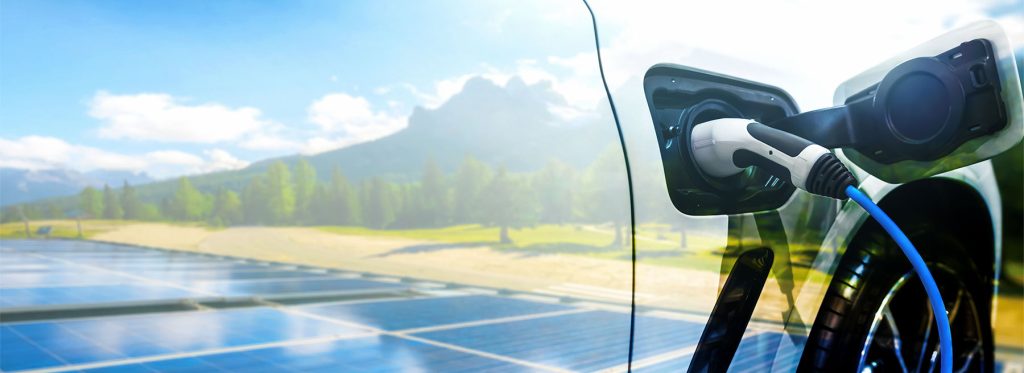Daytime EV Managed Charging Network.
Daytime EV Charging is Smarter Charging.
While the growth of electric vehicles (EV) has been slower in Australia compared to other nations, a rapid increase is already underway, with the number already doubling since 2020, and no sign of it slowing down.
The pressure that this growth will put on the electric grid makes it necessary for EV owners to utilise dynamic daytime charging systems, with healthcare facilities, shopping centres, councils, body corporates, carparks and airports perfectly placed to contribute to a solution.
Ergon Energy Network and Energex Network embarked on a research program in 2020 to better understand the charging patterns of EV drivers during the innovation phase of the adoption lifecycle to find ways that will mitigate emerging challenges that may come with the future growth.
According to the EV SmartCharge Queensland Insights Report, it is estimated that there were 31,784 EVs in Australia in 2020, with an incredible 83,000+ on Australian roads just two years later (Australian Electrical Vehicle Industry Recap 2022). This report carried out by Electric Vehicle Council found that there were 39,353 EVs purchased in 2022 alone with 3.8 per cent of all new cars purchased being EVs.

Reducing the demand on the grid
The EV SmartCharge research found that EVs have the potential to double the electricity demand of residential properties, adding almost half of the energy consumed in a typical household daily, based on recharging for an average daily commute. Localised parts of the network infrastructure are set to struggle to meet the increasing demand for EV charging with a higher number of vehicles on the road. This is one reason for a shift from night charging to daytime charging.
Daytime charging allows us to take advantage of underutilised renewable solar and wind generation and a more dynamic tariff, as the diversified daily charging profile is favourable to owners and networks alike.
Convenience charging at home during peak periods in the evenings could have negative impacts on the network, and there are higher costs associated with this practice for EV owners.
When analysing the EV SmartCharge report participants, the diversified average of home charging was 0.25kW. However, charging at night tripled the average to 0.75kW when assessing on the top 10 network peak days between 4pm and 9pm.
The EV SmartCharge Report noted that these participants from Southeast Queensland travelled 42.5km per day, 15 per cent more than internal combustion engine vehicles, with a corresponding 9.36kWh in daily consumption. This did not include regenerative charging.
Large battery electric vehicles (BEV) travelled on average 50 per cent more than BEV small vehicles and twice that of plug-in hybrid electric vehicles excluding petrol kms. This demonstrated that battery size and distance travelled are correlated.
Creating Incentives for EV Owners
Some EV owners may have the flexibility to park at home and charge during times when their solar PV is generating excess energy, however the majority do not. Households who are unable to capture PV energy into their vehicle during the day are more likely to charge their EV at night.
The EV SmartCharge report indicates that there is a common practice for people to convenience charge their EVs at home during the peak times, which over time, will put more pressure on the electric grid. There needs to be continual investment in EV charging infrastructure, which is something state governments across the country are encouraging.
The Queensland Government allocated $10 million to co-fund the installation of public fast-charging infrastructure, which builds on the Queensland Electric Super Highway, keeping EV drivers connected across the state. This initiative will minimise waiting time for long highway journeys and give confidence to EV owners that they have other charging options outside the home. They also introduced the Zero Emission Vehicle Rebate Scheme available to all new EV purchases in the state of a value up to $68,000 from 1 July 2023.
Incentives such as this are fast-tracking the Queensland Government’s targets for EV ownership which is expected to be 100 per cent of all new vehicles by 2036.
Business has the opportunity to look at a smarter solution which involves shifting from night charging to charging in the day as EV cars continue to skyrocket in popularity.
As a healthcare facility, shopping centre, council or body corporate, it is imperative to plan ahead to meet the future demand of a resource that will boost employee attraction and retention, and demonstrate your green credentials. It will also make healthcare facilities more attractive to visiting specialists.
As the EV SmartCharge research shows, the majority of EV owners have their vehicles parked at the workplace most of the time, only second to at-home charging. Businesses who offer EV charging stations are giving their staff and visitors an opportunity to top up after the morning commute and fully recharge while the car is not in use, reducing range anxiety and negating the need for high-cost installation of at-home chargers.
More convenience for EV owners
Owners of EV cars are faced with the initial costs of installing a charging system at home and potentially upgrading their switchboards. Plus, research by Origin Energy has shown the rapid growth of EV vehicles will increase peak electricity demand by at least 30 per cent if we continue to charge at home overnight.
People who live in apartments and only have street parking, or those who are renting and are unable to install at-home charging stations due to body corporate restrictions will be reliant on public access EV charging – workplace chargers will create an incentive for them. It takes the pressure off body corporates paying for the charging infrastructure and determining who is responsible for paying if only a small amount of residents own EVs.
Practising Corporate Social Responsibility
A significant excess of renewable energy is available during the day, with consumers and businesses feeding solar energy back to the grid to ensure no energy is wasted. Providing daytime charging at your premises is not only an employee incentive, but it demonstrates corporate social responsibility and gives you a chance to exercise your green credentials.
When owners manage their EV charging and take advantage of renewable solar generation, the diversified daily charging profile is favourable to everyone.
Many global businesses offer EV charging for their employees and visitors, with some providing it as a free benefit to employees, while others use it to generate additional revenue through user-paid charging.
Specifically for doctors and visiting specialists to hospitals, the convenience of onsite charging will make for an appealing factor when considering where to work or where to set up specialist practices.
The factor of employee incentives plus corporate social responsibility practices will attract and retain good staff and create a positive reputation for your facility.
Medical staff are expected to care for people and by providing EV charging, health care facilities will also be building on their green credibility and dedication to protecting the environment. This is such a crucial factor when considering building management, as being green has become an expectation.
About Flex Charge
Flex Charge is one such business that is working to support a shift in EV charging to take the pressure off the grid at these peak times. The Australian-based service provider of an electric vehicle charging network is an all-in-one reliable, flexible Daytime EV Managed Charging Network for healthcare facilities, shopping centres, workplaces, councils, body corporates, carparks, airports and more.
EV charging infrastructure requires ongoing management to ensure you are optimising consumption so that the charging stations are not demanding more than the current capacity available from the grid. This is a service that Flex Charge can offer.
Flex Charge is part of Velocity Energy and provides flexible and faster level 2 EV Charging units which they install and manage. Flex Charge uses a national EV app for payment and billing, dynamic load management and you can charge anywhere, anytime with Inter-Charge network roaming.
Founder, Richard Butcher, is dedicated to encouraging the shift to daytime charging for EVs to take pressure off the energy network, safeguarding the environment and making EV charging simple and flexible for everyone.
Flex Charge will be looking for interested healthcare facilities or shopping centres to participate in an EV charging trial in development.
Workplace Daytime EV Charging.
Learn more about the benefits of day time charging

